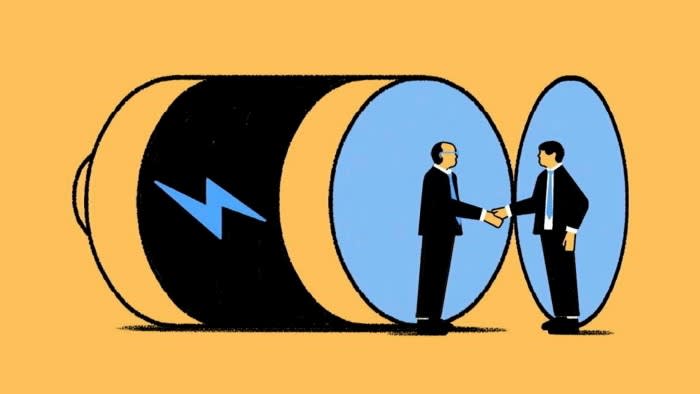Roula Khalaf, Editor of the FT, selects her favourite stories in this weekly newsletter.
The author is rector of the Institute for Human Sciences in Vienna
While the world was waiting eagerly to see if President Joe Biden would renounce his candidacy, German chancellor Olaf Scholz, almost unnoticed, was visiting Belgrade. Unheralded and arranged at short notice, his meeting a couple of weeks ago with Serbia’s President Aleksandar Vučić was nonetheless quite the party.
Accompanying Scholz were senior executives from Mercedes, Stellantis, the mining company Rio Tinto and three electric vehicle battery manufacturers — not to mention Maroš Šefčovič, the EU commissioner in charge of critical raw materials strategy, and the president of the European Bank for Reconstruction and Development.
Together they hailed the signing of a memorandum of understanding between the EU and Serbia to forge a partnership in critical raw materials and the establishment of a value chain for the manufacture of batteries and EVs.
This is a big deal, economically and politically. In the scramble for secure supplies of critical raw materials required for the green transition, the EU has been limping behind the US and China. Serbia has one of the largest lithium deposits in Europe, enough for an estimated 1mn EV batteries a year.
The lithium in Serbia’s Jadar valley is not the only source in Europe but, unlike the Chinese and Americans, Europeans are either more concerned about the environmental impact of large-scale mining or they are determined nimbyists, depending on your attitude. Without more access to metals such as lithium, the EU will neither meet its carbon reduction goals nor keep up with its competitors.
Scholz only agreed to go to Belgrade after Serbia reversed a 2022 decision to cancel a contract with Rio Tinto to exploit the lithium located near the border with Bosnia and Herzegovina. The renewal of Rio Tinto’s planning licence comes two months after Vučić turned down a request from China’s President Xi Jinping, for access to the metal. “China has enough already,” Vučić is said to have remarked in a reference to Chinese control of a copper mine in Bor, eastern Serbia.
This is further evidence that while Vučić continues to enjoy close political relations with China and Russia, he is integrating his economy ever more tightly with Europe and the US. The Jadar valley decision follows Serbia’s agreement to buy 12 Rafale jets from France rather than Russian MiGs and the revelation that Serbia is a key supplier of munitions to Ukraine.
Several influential western tech companies, such as Microsoft, Siemens and the American electric truck maker Rivian, have made big investments in Belgrade, attracted by a cheap, skilled workforce.
Many observers perceive Serbia to be a close ally of Russia and President Vladimir Putin. Yet Vučić has long been the Janus of the Balkans, looking both east and west. With the lithium decision he is sticking his neck out. He faces stiff opposition to it from three very different groups.
Serbia’s energetic environmental activists claim the Jadar project will harm the local ecology. They have organised protests across Serbia and point to the damage done by the Chinese-run copper mine. Rio Tinto and the EU contend that the Jadar development will be subject to more stringent environmental standards.
Florian Bieber, a Graz university political scientist, warns that as a quid pro quo for the lithium deal, the EU might ignore Vučić’s dictatorial tendencies, including his tight control of the media and dubious electoral practices.
That feeds into the wider politics of the western Balkans. Supporters of Kosovo and Bosnia have accused the EU of not responding to Serbia’s alleged attempts to undermine their territorial integrity — a claim European diplomats have rejected.
But Vučić’s policies have also upset Moscow. Just before Scholz’s trip, the Russian deputy foreign minister, Alexander Grushko, visited Belgrade. His meeting with Vučić was described by one insider as “frosty”. According to this person, “Grushko sat down and started reading a list of 23 complaints, including the Kremlin’s fury at Belgrade’s decision to supply Ukraine with munitions. When Grushko got about halfway through the list, Vučić stood up, announced the meeting was over and walked out.”
Vučić is a past master at gesture politics. But this goes beyond that. He is taking a big risk and so is the EU. If Rio Tinto can exploit the lithium with minimum damage to the environment, the rewards are considerable. But failure will both erode Vučić’s iron grip on power in Serbia and leave the EU’s critical raw materials policy looking, if not broken, then certainly tattered.
Source link : https://www.ft.com/content/91bf1365-daba-406d-86e8-15b595f485f3
Author :
Publish date : 2024-08-07 07:00:00
Copyright for syndicated content belongs to the linked Source.
